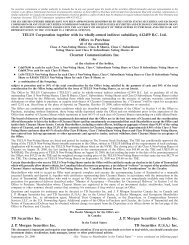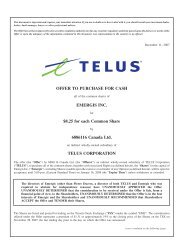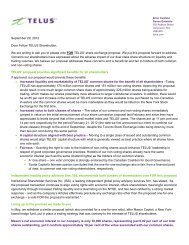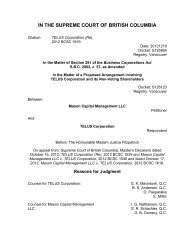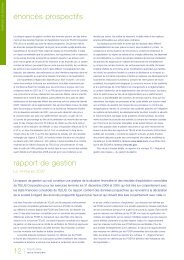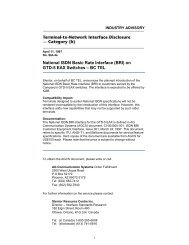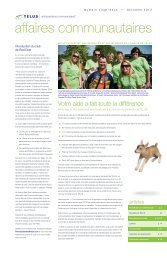Information Circular - About TELUS
Information Circular - About TELUS
Information Circular - About TELUS
You also want an ePaper? Increase the reach of your titles
YUMPU automatically turns print PDFs into web optimized ePapers that Google loves.
isk versus reward<br />
Our compensation program incorporates many long-standing<br />
elements that are intended to ensure our compensation<br />
practices do not encourage excessive or inappropriate risktaking.<br />
For example:<br />
. our mix of short, medium and longer-term compensation<br />
encourages executives to take a balanced view and mitigates<br />
against excessive risk-taking or behaviour that is too<br />
conservative<br />
. at-target, only 12.5 per cent of an executive’s pay (annual<br />
performance bonus) is tied to short-term results, while 50 per<br />
cent is tied to long-term incentives (RSUs and options)<br />
. the annual performance bonus and medium-term incentives<br />
(EPSUs) are directly linked to, and determined by, corporate<br />
performance (as measured by the corporate scorecard)<br />
and individual performance<br />
. targets for performance metrics in the corporate scorecard<br />
are stress tested and generally made more difficult each<br />
year to promote continuous stretch and performance<br />
improvement year over year<br />
. EPSU (medium-term) awards are linked to share price<br />
performance and are reduced in proportion to a decline<br />
in share price during a performance year (but are not<br />
increased in proportion to an increase in share price<br />
during a performance year)<br />
. annual performance bonus and EPSU award payouts can<br />
be as low as zero, if minimum threshold levels of corporate<br />
and individual performance are not met, and are capped at<br />
200 per cent where corporate and individual performance<br />
objectives are exceeded, to prevent excessive payouts and<br />
to act as a disincentive against excessive risk-taking<br />
. individual performance objectives are tied to a strong team<br />
culture which precludes individual executives from acting<br />
unilaterally without clear leadership team knowledge,<br />
involvement or approval<br />
. long-term incentive awards can range from zero for an<br />
executive with a low PVAAM rating, to an amount that would<br />
place the total direct compensation (base salary + annual<br />
performance bonus + EPSU awards + RSU/option awards)<br />
at or near the 75th percentile of the comparator group<br />
for an executive who is determined to be a crucial resource<br />
to the Company based on his or her PVAAM rating<br />
48 . <strong>TELUS</strong> 2012 information circular<br />
. we require all of our executive vice-presidents to own at<br />
least 1x their annual base salary in Shares and the CEO to<br />
own at least 3x his annual base salary in Shares. Options,<br />
EPSUs and RSUs are not included in the calculation of an<br />
executive’s share ownership<br />
. long-term incentives are granted on an annual basis, based<br />
on performance, to encourage consistent performance year<br />
over year and to prevent behaviour that might be intended<br />
to maximize a multi-year award.<br />
The Board maintained its strong focus on risk oversight in<br />
2011 by considering the results of an extensive review that was<br />
conducted in three parts starting in 2010: an assessment of<br />
the adequacy of the Board’s framework for risk oversight, an<br />
assessment of the key enterprise risks and an in-depth risk<br />
analysis of our executive compensation programs. As a result<br />
of this review, in 2011, the Board formally expanded the<br />
Compensation Committee’s risk oversight activities by amending<br />
its terms of reference to include a mandatory annual review<br />
of the linkage between our pay practices and risk. In 2011, this<br />
assessment was conducted by the Committee’s independent<br />
consultant, Meridian, who concluded that there are appropriate<br />
measures in place to mitigate or balance any potential for<br />
undue risk-taking. Meridian based its assessment on a<br />
scorecard that reviewed 47 dimensions across the following<br />
five categories:<br />
. pay philosophy and governance<br />
. pay mix and balance<br />
. incentives and performance measurement<br />
. stock-based ownership guidelines<br />
. compensation policies and provisions.<br />
After considering the results of the assessment, the<br />
Compensation Committee did not identify any risks arising<br />
from the Company’s compensation policies and practices<br />
that would be reasonably likely to have a material adverse<br />
effect on the Company.



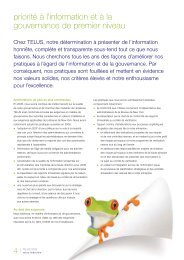
![DISK004:[98CLG6.98CLG3726]BA3726A.;28 - About TELUS](https://img.yumpu.com/16786670/1/190x245/disk00498clg698clg3726ba3726a28-about-telus.jpg?quality=85)
